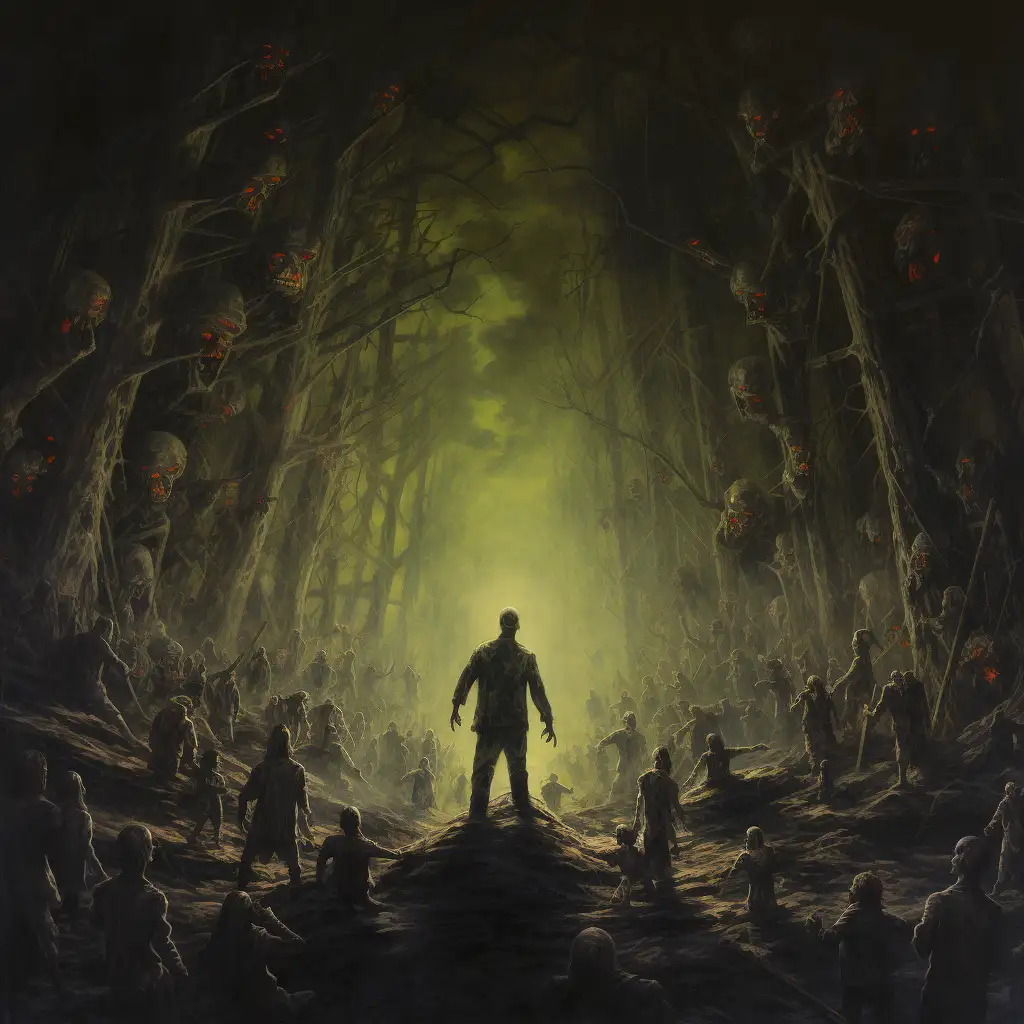Key Takeaways
2. Dreams occur during the REM stage of sleep when our brains are highly active and engage in processing emotions, memories, and sensory experiences.
3. Dreaming of a dead person during REM sleep reflects our thoughts, emotions, and memories associated with that person, serving as a way for our brain to process grief, nostalgia, or unresolved feelings.
4. Historical and cultural beliefs about dreams have shaped our modern understanding, with ancient cultures considering dreams as divine messages and pathways to the spiritual realm.
5. Dreams about the deceased can vary widely, from comforting experiences to distressing nightmares, and they are a normal part of the grieving process.
6. Interpretations of dreams about the deceased depend on the dreamer’s personal experiences, emotions, and the context of the dream, making dream interpretation highly subjective.
7. Dreaming of a dead person being alive might indicate a longing for the past or difficulty accepting their death, while receiving messages from the deceased can symbolize inner wisdom or unresolved issues.
8. Dreams about the deceased can provide opportunities for healing, closure, personal growth, and spiritual insights, helping individuals navigate the grieving process.
9. Keeping a dream journal, reflecting on dream context and emotions, and seeking professional help if necessary can contribute to understanding and processing dreams about the deceased.
Have you ever woken up with the vivid memory of a dream, only to realize that it featured a person who is no longer alive? It can be a startling experience, but you’re not alone. Dreams involving deceased individuals are a common part of our dream lives. Today, we’re going on an in-depth journey to better understand what it means to dream of someone who has passed away.
The Science of Dreams
When we say goodnight to the world and sink into the realm of sleep, our brains don’t simply switch off. On the contrary, they remain incredibly active, working behind the scenes to produce the phenomenon we know as dreams.
Understanding the Sleep Cycle
Understanding the structure of our sleep is key to understanding dreams. Throughout the night, we cycle through different stages of sleep: light sleep (stage 1 and 2), deep sleep (stage 3), and finally, REM (Rapid Eye Movement) sleep. Each stage has its own distinct physiological characteristics and purposes.
Role of REM Sleep
It’s during REM sleep, named for the characteristic rapid movement of the eyes under our closed lids, that our most vivid, story-like dreams occur. While we spend about 20-25% of our sleep in REM, this proportion can vary depending on factors such as age and overall sleep health.
Brain Activity During REM
During REM sleep, the brain is almost as active as when we’re awake. Various parts of our brain light up with activity, particularly areas associated with processing emotions, memories, and sensory experiences. The amygdala, which plays a key role in processing emotions, and the hippocampus, which is pivotal for memory consolidation, are both notably active during this stage.
Dream Formation in REM
During REM sleep, it’s like a nightly theatre performance taking place in our minds. We’re the audience to a complex interplay of our subconscious thoughts, feelings, and memories. And sometimes, the cast of these performances includes individuals who are no longer with us in waking life. This encounter with deceased individuals in dreams can evoke strong emotional responses and leave lasting impressions upon waking.
Connecting REM Sleep and Dreaming of the Deceased
Scientifically, dreaming of a dead person during REM sleep can be seen as a reflection of our thoughts, emotions, and memories associated with that person. It’s our brain’s way of processing grief, nostalgia, or unresolved feelings. This process is a part of our mental wellbeing and contributes to our emotional and psychological processing of loss.
So, as we venture into understanding the science of dreams, we uncover the beautiful complexity of our brains and the remarkable capacity of our minds to create, remember, and feel, even as we sleep.
Historical Perspectives on Dreams about the Dead
Across time and cultures, dreams have always been regarded with a sense of mystique and significance. They have been interpreted in numerous ways, serving as spiritual gateways, prophetic visions, or simply reflections of our subconscious. Dreams featuring those who have passed away hold a particularly poignant place in many of these interpretations.
Dreams in Ancient Cultures
In ancient cultures, dreams were often viewed as a bridge between the earthly and spiritual realms. Egyptians, for example, believed dreams to be divine messages from the gods. If you dreamt of a deceased person, they considered it a powerful omen or a message from the underworld.
Ancient Greeks also placed great importance on dreams. They believed that the dead could visit the living in their dreams, offering guidance or warnings. Dream interpreters known as ‘Oneirocritics’, like the famous Artemidorus, would analyze these dreams, providing insight and direction based on their meanings.
Dreams in Indigenous Cultures
Many indigenous cultures around the world also share profound beliefs about dreaming. For instance, Australian Aboriginal cultures perceive dreams as a time when the soul travels and communicates with the ancestral spirits, including deceased loved ones. This belief underscores the deep connection between dreaming and the spiritual realm.
Influence of Historical Beliefs on Modern Perspectives
While our modern understanding of dreams has certainly evolved with science and psychology, the historical and cultural beliefs surrounding dreams, especially those involving the deceased, continue to shape our perceptions. The notion of receiving guidance or messages from the dead, for example, still resonates with many people today.
Understanding these historical perspectives can provide a richer context to our own experiences with dreams about the dead. It serves as a reminder that across time and cultures, humans have sought meaning and connection in these nocturnal visions, linking us in a shared dream tapestry woven through the centuries.

Grief and Dreams
Experiencing the loss of a loved one is a profound life event. It’s a journey of healing that often navigates waves of sadness, acceptance, and a longing for what once was. An integral part of this journey can be dreams, which often serve as a canvas for our minds to portray, process, and sometimes even soothe, the depths of our loss.
Dream Visits from Loved Ones
In the quiet refuge of sleep, you might find a familiar face appearing in your dreams – a loved one who is no longer with us in the physical world. It’s a common phenomenon for those in the throes of grief, almost as if our minds seek out the comfort of their presence in the dreamscape.
Role of Dreams in the Grieving Process
Dreams are often viewed as a ‘safe space’ for our emotional processing. They provide an avenue where we can continue to engage with the deceased, a place where we can say the words left unsaid, relive cherished memories, or even confront unresolved issues.
For some, these dream encounters can be therapeutic, facilitating a deeper understanding and acceptance of the loss. They can help us move through the stages of grief, from denial and anger to acceptance and hope, allowing us to embrace healing in our own time and in our own unique ways.
Nightmares and Distressing Dreams
While some dreams can bring comfort and closure, it’s important to acknowledge that not all dreams during grief are soothing. Some people may experience distressing dreams or nightmares, echoing the turmoil and pain of their loss. These difficult dreams are also a normal part of the grief process, reflecting the emotional intensity of bereavement.
Understanding and Embracing the Role of Dreams in Grief
Dreams in the face of grief can be multi-faceted, weaving together threads of memory, longing, love, and pain. They can be comforting, distressing, mysterious, or illuminating. But, at their core, they represent a deeply human response to loss and an intimate part of our journey towards healing.
In acknowledging and understanding this, we can navigate our dreamscape with compassion, resilience, and perhaps even a sense of solace, knowing that our dreams are with us, as we move through the grieving process.
Common Scenarios in Dreams about the Dead and Possible Interpretations
Dreams about dead people can vary widely depending on the dreamer’s experiences, feelings, and the context of the dream. Here are a few common scenarios that might occur and their possible interpretations.
1. Dreaming of a Deceased Loved One Being Alive
Dreaming of a dead person being alive and well is a common dream scenario. In these dreams, you might interact with the loved one as though they’re still part of your waking life.
- Interpretation: Such dreams might indicate a longing for the past or an inability to fully accept the reality of the loved one’s death. Alternatively, it might represent a healing process where the mind is seeking comfort and peace by envisioning the deceased as vibrant and alive.
2. Receiving Messages from the Deceased
In some dreams, you might receive direct messages or advice from the deceased. They might share wisdom, offer reassurances, or deliver warnings.
- Interpretation: These dreams could represent your own inner wisdom or intuition, projecting itself in the form of a loved one’s voice. Alternatively, it could symbolize unresolved issues or questions that you wish you could discuss with the person who has passed away.
3. Participating in Everyday Activities Together
Sometimes, dreaming of a dead person involves participating in mundane or everyday activities together, such as having a meal, taking a walk, or just talking.
- Interpretation: Dreams of this nature can signify a longing for normalcy or a desire to recapture the simple, everyday moments you once shared with the loved one. They might also provide comfort, as you continue to feel a sense of connection with the deceased.
4. Seeing the Deceased at Different Life Stages
You might dream of the deceased person at different ages or life stages – perhaps as a child, a young adult, or an older person.
- Interpretation: This could reflect different periods of your relationship with them, or it might represent different aspects of your own life and personal growth. Seeing the deceased at a younger age, for instance, might symbolize nostalgia or a yearning for simpler times.
It’s important to remember that dream interpretation is highly subjective. While these are some potential interpretations, the true meaning of your dreams about deceased individuals depends largely on your personal experiences, emotions, and the context of the dream. As you explore these dreams, take note of how they make you feel and what personal significance they may hold for you. After all, you are the best interpreter of your own dreams.
Dealing with Disturbing Dreams about the Dead
While many people find comfort in dreams about their deceased loved ones, not all such dreams bring peace. Sometimes, dreams about the deceased can be distressing, unsettling, or downright terrifying. It’s important to remember, though, that if you’re experiencing such dreams, you’re not alone. Here’s how you can navigate this challenging terrain.
Understanding Disturbing Dreams
Firstly, it’s crucial to understand that dreaming of a dead person is a normal part of the grieving process for many people and sometimes these dreams can be distressing. However, these distressing dreams reflect the depth of your grief and the emotional turmoil you’re going through.
Dealing with Disturbing Dreams
There are several strategies that might help you manage distressing dreams. Here are a few to consider:
- Journaling: Keep a dream journal and write down everything you can recall about your dreams as soon as you wake up. Over time, you might start to see patterns or themes that could provide insight into why you’re having these dreams.
- Relaxation Techniques: Practices like meditation, deep breathing, and progressive muscle relaxation before bedtime can help reduce anxiety and promote better sleep.
- Establish a Bedtime Routine: Keeping a consistent sleep schedule, limiting exposure to screens before bed, and ensuring your sleep environment is comfortable and calming can also contribute to better quality sleep.
- Positive Imagery: If you wake up from a disturbing dream, try to replace the upsetting images with ones that are comforting or pleasant. Visualization techniques can be helpful here.
Seeking Professional Help
If your dreams are causing you significant distress, it might be helpful to speak to a professional. Mental health professionals, such as psychologists or counselors, can provide valuable tools and strategies for managing distressing dreams. They can also help you navigate the emotional undercurrents that might be contributing to these dreams.
Support Groups and Peer Sharing
Sometimes, sharing your experiences with others who are going through similar experiences can be incredibly comforting. Support groups—whether in-person or online—provide a safe space to share, listen, and find reassurance in the shared experiences of others.
Distressing dreams about deceased loved ones can be challenging to navigate, but remember that you don’t have to face them alone. Reach out, seek help, and know that it’s okay to ask for support when you need it.

Positive Aspects of Dreaming about the Dead
Although dreams involving deceased individuals can sometimes cause distress, it’s essential to remember that they also hold potential for comfort, healing, and profound personal insight.
Dreams as a Source of Comfort
Dreams about the deceased can bring a sense of continued connection to the loved one. Whether they appear alive, engaged in familiar activities, or communicating in some form, these dreams can provide a comforting sense of their presence, bridging the gap between memory and loss. This sense of closeness can provide solace during the grieving process.
Dreams and the Healing Process
In the journey of grief, dreams can play an important role in the healing process. They can help you process a range of emotions, from sadness and longing to acceptance and peace. Whether you’re engaging with the deceased, expressing unspoken words, or receiving messages, these dreams can guide you towards resolution and peace.
Dreams as a Medium for Closure
Sometimes, dreams about the deceased bring messages of peace or reassurance, providing a sense of closure. These dreams can help you come to terms with your loss and make peace with your feelings of grief.
Exploration of Personal Feelings about Mortality
Lastly, dreams about deceased individuals can prompt introspection about life, death, and our own mortality. They can encourage you to explore your beliefs, fears, and hopes about death and what lies beyond. This process can lead to personal growth, spiritual insights, or a deeper appreciation for the life you’re living now.
Dreaming about the deceased is a deeply personal experience that can encompass a wide spectrum of emotions. While the journey may involve periods of distress, it’s also laden with potential for comfort, healing, closure, and personal growth. By acknowledging and embracing this, we can navigate our dreamscape with compassion and resilience, drawing strength from the bonds that not even death can sever.
Dreaming of a Dead Person: Conclusion
Whether comforting or confusing, dreaming of a dead person is a common experience that can hold deep personal meaning. It’s perfectly normal and often, it can be part of the process of navigating our feelings and experiences.
Dreams are personal, and their meanings can be as unique as the dreamers themselves. As you navigate your dreamscape, keep an open mind, be gentle with yourself, and remember that this is all part of being beautifully, irrevocably human.
FAQs
A: Not necessarily. Dreams can stem from a variety of factors, including subconscious thoughts, memories, and emotions. While some dreams about dead people may hold deeper meanings, others could simply be a result of your mind processing past experiences.
Q: Can dreaming of a dead person be comforting?
A: Yes, for some individuals, dreaming of a deceased loved one can provide comfort and a sense of connection. These dreams may offer solace or serve as a way for the subconscious mind to process grief and loss.
Q: Is it common to have recurring dreams about a dead person?
A: Recurring dreams about a dead person are not uncommon. They might indicate unresolved emotions or issues related to the deceased individual. If you experience persistent or distressing recurring dreams, it may be helpful to explore these emotions further or seek professional guidance.
Q: Are there any cultural or spiritual beliefs associated with dreaming of dead people?
A: Yes, different cultures and spiritual traditions hold various beliefs about dreams involving deceased individuals. Some cultures view such dreams as a way for the spirits of the departed to communicate or offer guidance. It’s important to consider your own cultural or spiritual background when interpreting these dreams.
Q: Can I control or influence my dreams about dead people?
A: While you may not have direct control over the content of your dreams, certain practices may help enhance dream recall or promote a positive dream state. Keeping a dream journal, practicing relaxation techniques before bed, and maintaining a consistent sleep schedule are some methods that may influence your dream experiences.
Q: Should I be concerned if I frequently dream about a dead person?
A: Frequent dreaming of a dead person does not necessarily indicate a cause for concern. However, if these dreams consistently cause distress, hinder daily functioning, or intensify feelings of grief or sadness, it could be beneficial to discuss your experiences with a mental health professional.
Q: Can dreaming of a dead person have any psychological or therapeutic significance?
A: Dreams, including those involving dead people, can offer insights into our subconscious mind and emotional well-being. Analyzing and exploring these dreams can sometimes provide therapeutic benefits, allowing individuals to process their emotions, find closure, or gain a deeper understanding of their relationships with the deceased.
Q: Is it possible to communicate with the dead through dreams?
A: While some individuals believe that dreams can serve as a means of communication with the deceased, it’s important to approach such experiences with skepticism. Dreams are subjective and personal, and the interpretation of any potential communication should be based on individual beliefs and experiences.
Q: Can dreams about a dead person be prophetic or predictive?
A: Dreams about dead people are generally not considered prophetic or predictive in nature. They typically reflect the dreamer’s thoughts, emotions, and subconscious processing rather than offering glimpses into the future. It’s important to interpret dreams within the context of one’s personal experiences and belief system.
Q: What should I do if I have a distressing dream about a dead person?
A: Distressing dreams can be unsettling, especially when they involve deceased individuals. If you have a disturbing dream, it can be helpful to engage in calming activities before bed, such as reading a book or practicing relaxation techniques. If the dreams persist and significantly impact your well-being, it may be beneficial to seek support from a mental health professional.
Q: Can medication or substances influence dreams about dead people?
A: Certain medications or substances can impact dream patterns, intensity, or recall. It’s possible that they may affect dreams about dead people as well. If you notice significant changes in your dream experiences after starting a new medication or using substances, it’s advisable to consult with a healthcare professional to better understand the effects.
Q: Are there any techniques to enhance dream clarity and recall for dreams about dead people?
A: Yes, there are techniques that can help improve dream clarity and recall. Keeping a dream journal by your bedside and recording your dreams immediately upon waking can enhance your ability to remember details. Additionally, practicing mindfulness or meditation can increase self-awareness, potentially leading to a more conscious and vivid dream state.
Q: Can dreams about a dead person provide healing or closure?
A: Dreams involving dead people can sometimes contribute to the healing process and provide a sense of closure. These dreams may offer opportunities to address unresolved emotions, say goodbye, or receive messages from the subconscious. However, it’s important to approach dream interpretation with openness and personal reflection to determine their individual significance.







